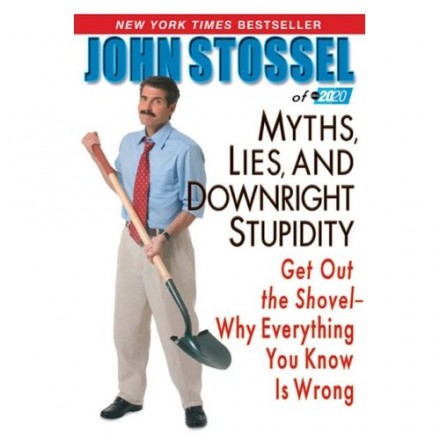John Stossel
One of the best journalists around today is John Stossel. When I was a kid, my mom would come home from work late on Friday nights, and I used to stay up and watch 20/20 at 10 pm. At that time, Stossel was a consumer reporter/investigative journalist on the show and I used to enjoy watching his segments. He had a witty style and a dry sense of humor, and he just seemed to make a lot of practical sense, even though at that time I probably wasn’t paying attention to much other than sports and school. Now, Stossel co-hosts 20/20 with Elizabeth Vargas and also writes a column for TownHall.com.
He is also the author of the book Myths, Lies, and Downright Stupidity, which debunks the conventional wisdom regarding a wide range of topics including the health effects of chocolate, the price of gasoline, the safety of public schools, world overpopulaton, landfill space, etc. Stossel’s work generally supports a libertarian philosophy and a belief in free markets and small government, which is probably why he made so much sense to me when I was growing up!
December 10, 2008 6 Comments
The Real Problem With Detroit
I’m a little bit incensed that the government is going to loan the U.S. auto industry $25 billion, and possibly more. I have always thought that these are poorly run companies that design lousy cars, or cars that were too big and fuel-inefficient, and as such they deserve to fail. But I also thought that because of the high labor cost brought about by the United Auto Workers (UAW) union, it was difficult for the U.S. auto companies to be as flexible as they needed to be.
I was recently speaking with a friend who argued that the big problem was management, that the executives at these companies were just plain dumb. It was hard to disagree with that, but after doing a little reading, I can’t really place that much blame on the executives. Ford, GM, and Chrysler have been shuffling through executives in recent years – could they really all be dumb?
It’s really a much more complicated issue than that, and it has to do with the UAW and the Corporate Average Fuel Economy (CAFE) standards. Let’s address the UAW. There are basically two auto industries operating in the U.S. There’s one in Detroit which includes GM, Ford, and Chrysler, where the workers are all UAW. Then there’s one in the southern U.S. which includes Honda, Toyota, and Hyundai. Their workers do not belong to a union and work predominantly for less money (although that is not always the case) and no pension benefits.
Now, the CAFE standard basically mandates that your entire fleet of domestic vehicles has a minimum fuel efficiency, or else you pay a fine based on how much you’re over that minimum. As a result of CAFE, the UAW, and low fuel prices, the U.S. automakers were basically forced to make more SUVs and trucks, because those vehicles have much higher margins, and are much more profitable – at least when they’re selling. But, to meet CAFE, the U.S. automakers also had to offer a line of much lower profit-margin fuel-efficient vehicles. In order to keep costs low, for years the companies skimped on styling, materials, and engineering, to the extent that they lose money on each and every fuel-efficient small and mid-size car they sell.
Instead of letting the free-market dictate the winners and losers in the auto industry, the U.S. government intervened, first through CAFE and now through a generous though not unprecedented lending program. The UAW has huge sway in Washington over our political leaders, and they have Barack Obama as an ally. President-elect Obama also supports the Employee Free Choice Act, which will make it easier for auto industry workers in the southern U.S. to unionize. He also wants to raise tariffs on cars imported from South Korea by renegotiating our trade pact with them. I fear the result of all this will be more expensive, lower-quality cars for the masses. But this isn’t going to hurt the rich, just the lower and middle-class.
November 6, 2008 No Comments
